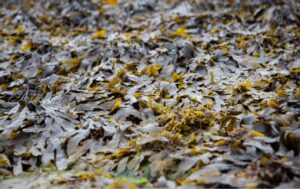
Many people find the idea of adding seaweed to their SAD (standard american diet) repulsive!. You may be surpeised to find out, the benefits of seaweed have been well documented for quite some time and are common part of the Japanese lifestyle. As you know, most Japanese have lifestyle that is considered by some to be among the healthiest in the world! It is their lifestyle and dietary habits that have contributed to the Japanese high “centenarian population.” TO me it just makes sense to incorporate some of what is working so great for the Japanese into our American lifestyle. Well, recently, a new type of seaweed is making headlines for its ability to promote weight loss and help with hypertension. It’s known as Wakame seaweed. Wakame seaweed is high in vitamin levels A, C, E and K which are powerful antioxidants. A recent study performed in Italy showed a correlation with antioxidants and a longer lifespan. Seaweed in general is rich in minerals such as iron, calcium and iodine. Most of these minerals can be found in various foods, but you can find a majority if these all localized in seaweed.
How does the Wakame help stimulate weight loss?
Studies have shown that a substance extracted from Wakame, called fucoxanthin, targets a protein called UCP1. The fucoxanthin helps to increase the rate at which abdominal fat is burned. Abdominal fat surrounds our organs and is linked to heart disease and diabetes. So, basically, the faster you get rid of abdominal, the lower your risk of developing heart disease and diabetes becomes.
Diabetes?
Fucoxanthin also stimulates the production of DHA. DHA which is an omega-3 fatty acid has been proven to decrease insulin in blood glucose levels. Many types of fish, such as salmon, contain high levels of DHA. The fucoxanthin stimulates the DHA levels which increases insulin sensitivity, improves triglycerides, and aids in lowering your LDL. (bad cholesterol)
Cancer?
Although not much has been reported on fucoxanthin’s affects on cancer, some studies have shown that the fucoxanthin extracted from the Wakame seaweed actually has anti-tumor effects.
According to Colin J. Barrow and Fereidoon Shahidi, authors of “Marine Nutraceuticals and Functional Foods,” fucoxanthin was found to be the main constituent that inhibited production of cancerous cells in a study of seafood extracts on tumors. The experiment was conducted to test the effect of fucoxanthin on prostate cancer. Of all the present cartenoids, fucoxanthin showed the highest activity in reducing the growth of prostate cancer cells. Further studies indicated evidence of fucoxanthin’s ability “to reduce the viability of other human colon cancer cells,” according to the Barrow and Shahidi’s book.
The best part of Wakame Seaweed is the ease in which it can be integrated into a part of your daily nutritional plan. It only takes about 2tbs of dried Wakame seaweed mixed in water or your favorite drink to unlock its boundless benefits. It can even be sprinkled on your favorite dish to increase the nutrient density of your meal.
References:
- http://www.livestrong.com/article/279486-brown-seaweed-fucoxanthin-information/#ixzz1QD9ouMeZ
- Santrock, John. (2008). Physical Development and Biological Aging. In Mike Ryan, Michael J. Sugarman, Maureen Spada, and Emily Pecora (Eds.), A Topical Approach to Life-Span Development (pp. 129-132). New York: McGraw-Hill Companies, Inc
- Mecocci P, Polidori MC, Troiano L, et al. (Apr 2000). “Plasma antioxidants and longevity: a study on healthy centenarians”. Free Radic Biol Med. 28 (8): 1243–8. doi:10.1016/S0891-5849(00)00246-X. PMID10889454. http://linkinghub.elsevier.com/retrieve/pii/S0891-5849(00)00246-X. Retrieved 2011-01-18.
- http://www.lef.org/magazine/mag2008/abstracts/mar2008_Fucoxanthin-VitaminK-Probiotics_01.htm